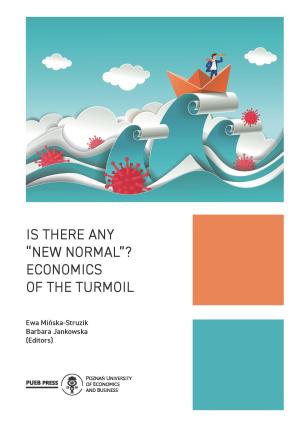
e-ISBN: 978-83-8211-217-7
DOI: 10.18559/978-83-8211-217-7
Edition: I
Publication date: 2024
First publication date: 2024
Pages: 255
Print: paperback
Electronic version: pdf
Format: B5
License : open access
COVID-19, economic crisis, European integration, globalization, sustainable development, international business, transport, tourism market, logistics, e-commerce, consumption, companies
last week: 23
last 3 months: 185
Edited by
Ewa Mińska-Struzik, Barbara Jankowska
Is there any ‘new normal’? Economics of the turmoil
Availability and purchase
Electronic version(IBUK)Electronic version
(CEEOL)
*Clicking the button takes you to an external open access or selling platform.
The book is available in library subscriptions: Ibuk Libra and EBSCO.
Mińska-Struzik, E. and Jankowska, B. (Eds.). (2024). Is there any ‘new normal’? Economics of the turmoil. Poznań University of Economics and Business Press. https://doi.org/10.18559/978-83-8211-217-7
Foreword (B. Jankowska, E. Mińska-Struzik)
Part I. Challenges at the supranational and national level
1. The COVID-19 pandemic in the disaster and economic discourses (G. Palzur)
2. Macroeconomic implications of the COVID-19 revisited (T. Kowalski)
3. Resilience of Poland's economy to external shocks: A comparative study of tourist arrivals in relation to Lithuania, Spain and Portugal (J. Majewska, S. Truskolaski)
4. The European Union’s Common commercial policy in times of turmoil (G. Mazur)
5. The impact of the COVID-19 pandemic on migration in Europe (J. Cabańska)
Part II. Challenges for business sectors and industries
6. The geography of consumer goods logistics in Poland – a diagnosis of the period since the COVID-19 pandemic (P. Banaszyk, W. Budner,)
7. Determinants of competitiveness of Polish road carriers (P. Banaszyk, S. Konecka, A. Maryniak)
8. Dilemmas of organising public transport in COVID and post-COVID times (M. Jurczak)
9. Substitution of tourism trips as a result of the COVID-19 pandemic – an empirical verification (A. Niezgoda, E. Markiewicz)
Part III. Challenges for companies and consumers
10. Firm capabilities, export diversification, and crisis affectedness: a study of Polish exporters during the COVID-19 pandemic in 2020-2021 (M. Gorynia, P. Trąpczyński)
11. The impact of COVID-19 pandemic on sustainable business practices – case of an international logistics company (Ł. Małys, R. Jabłoński)
12. Factors influencing consumer trust in sharing economy platforms – A comparative study of Polish and Moroccan consumers (W. Rakowska, Z. Talouni)
With the outbreak of the COVID-19 pandemic, the world came to a standstill. Scholars and policymakers dealing with the economic consequences of the pandemic quickly realised that returning to the pre-pandemic state was impossible—the global community had been heading toward a “new normal”. Unfortunately, before we could recognise and tame the “new normal” for good, it was disrupted by the Russian invasion of Ukraine and subsequent energy crises. Therefore, in the monograph’s title, we question whether any “new normal” exists. However, disruptions and shocks are unimaginable to get used to; as researchers, we believe knowledge becomes particularly valuable in such circumstances. Defining, studying and describing turmoils allow, if only to some extent, to control the damages they cause. Hence, the research presented in this book aims to identify and explore challenges at the supranational and national levels. Focusing on those challenges, we got to investigate the multidimensional impact of the pandemic shock on business reality. In doing that, we hoped to collect a valuable foundation for formulating a resilience policy, which, to be effective, must respect the peculiarity of national economies, industries, firms, and individual consumers.
Chapters:



 Full text download (pdf)
Full text download (pdf)